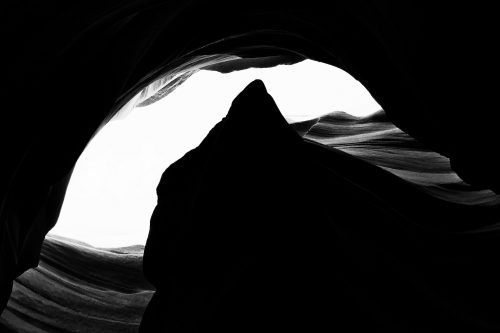It’s funny—it took a week of living alone in a cave with no technology to finally launch my web site.
Roman students of Stoicism were often taught to practice that which they feared most, in order to experience the world that they were afraid of. As I was reading Seneca one day, I stumbled across this quote:
Set aside now and then a number of days during which you will be content with the plainest of food, and very little of it, with rough coarse clothing, and ask yourself: ‘Is this what one used to dread?’
So I set out to experience my deepest unknown: a month without technology. No sleeping bag, no tent, no backpack—just a blanket, a compass, and a few necessities to survive. And, of course, my Moleskine.
It was a 28-day primitive skills course, focused on preparing us to survive in the wilderness. Three instructors led us through the Utah desert, teaching us to make fire, to navigate, to find water, to set up camp and stay warm at high elevations.
Minimalism, at its root, is more than just throwing away everything that you own. It’s about learning to thrive—not survive, but thrive—regardless of your circumstances. Living in nature reveals that happiness and satisfaction come from inside, not from material possessions.
I journaled every day. I have hundreds of pages of internal thoughts, emotions, and fears recorded during both times of extreme stress and times of abundance. But the most interesting part, for me, was the Solo phase: five days, alone, with no human contact whatsoever.
Our group split up and we were each assigned a section of land. Alongside the Escalante river, I set up camp in a nearby cave. As I read my journal today, I realize that, at least for those few days, I became a different person. I became the person I wanted to be.
Since 2008, I’ve had a blog, Hack The System. For over three years, that site lay dormant. I wanted to write articles, I really did. But I kept getting distracted.
My teachers called it ADHD. My mom said I needed to drink more milk. Go figure.
But, in the wilderness, things were different. Free from distractions, free from Internet, TV, notifications, ringtones, and other people, I realized that, deep down inside me, there was a kid who was able to achieve a goal. There was a kid who could start writing and keep writing until the sun absconded below the peaks of the Escalante Monument.
I wrote more than seven hours a day. I woke at daybreak, ate prickly pears that grew wild near the river for breakfast, sat down in the shade, and began to write. Besides moving every few hours to avoid the blistering sun, I was fixated on my Moleskine, letting the words flow through me. By the end of five days, I had written over 15,000 words for Hack The System—more words than I’d written in three years.
We hear this advice all the time—just turn off your phone! Close your office door! But the fact is, our culture has changed. We’ve shifted from a Meal Society to what Eben Pagan calls the Snacking Society.
Not many people sit down for meals anymore. As I write these words, I see a bag of chips, some cupcakes, and a half-drunk bottle of apple juice on my kitchen counter. Instead of organizing our meals around breakfast, lunch, and dinner, we simply grab food whenever we feel like it. There is no beginning and no end.
We live our lives in the same way. We don’t sit down to focus on a task for specific block of time. Instead, we work for a few minutes, and then snack on our email, and then maybe Alt-Tab back to our work, and then snack for a few minutes on Facebook or Skype or texting.
I thought I couldn’t achieve my goals because of a lack of focus. Instead, the real reason was the flood of distraction. When left to my own devices, I tend to fall into a pattern of Facebook or chatting or Reddit. I call this the Set Place—what you revert to becomes who you are.
But when I made a drastic shift in my context, by living away from technology, from any potential distraction, there was nothing else I could possibly do besides focus on the monster, the ever-present-but-impossible-to-achieve-thing that I wanted to do: write.
How much of your life do you spend in this grey zone? How often do you sit down for a concentrated period of focused work, without checking your phone or email at all? Success isn’t about being “on” all the time—it’s about focusing for intense bursts of time, and then disengaging.
The path to achieving these goals—be it minimalism, productivity, focus, or even losing 23 lbs in 28 days—is often a function of context, not of willpower. You have to create a self-reinforcing context that makes it impossible to fail.
Maneesh Sethi writes at his blog, Hacking the System.


